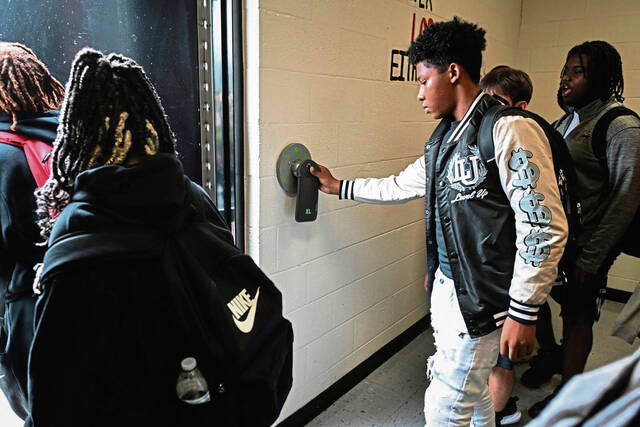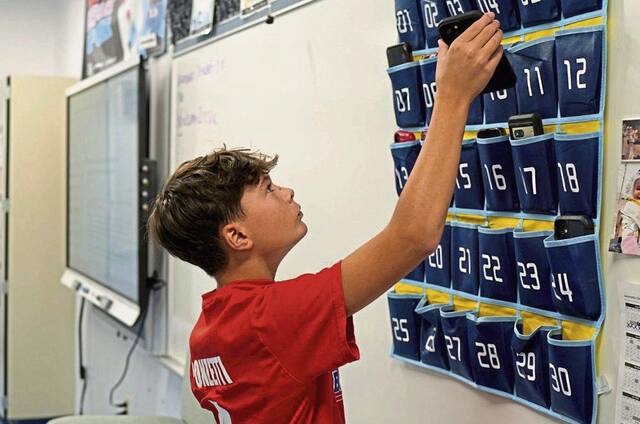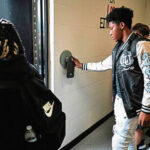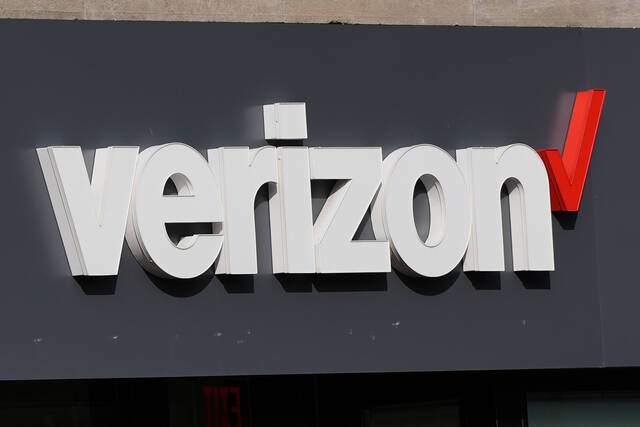Tony Aquilio is all in favor of using technology as an educational tool. But even Aquilio, Penn-Trafford High School’s principal, admits access to personal cellphones can be bad for learning while in school.
This year, Penn-Trafford School District heads into the academic year with a new cellphone policy in place, requiring students to turn in their phones at the start of each class.
“We think technology is awesome, and it can be used for a lot of great things in education,” Aquilio said, “but it’s just unfortunate that with awesome technology, there’s downfalls with that as well.”
Penn-Trafford isn’t alone. Nationwide, 27 states have passed legislation restricting cellphone use in classrooms — a trend that some Pennsylvania legislators are looking to replicate.
State Sens. Devlin Robinson, R-Bridgeville; Vincent Hughes, D-Philadelphia; and Steven Santarsiero, D-Bucks, plan to introduce legislation restricting cellphone use in all 500 Pennsylvania public school districts.
This isn’t the first time school cellphone restrictions have been proposed in state.
Former Sen. Ryan Aument, a Lancaster County Republican, introduced a bill in June 2024 that would administer grants for school districts to buy locked bags for students to store their cellphones in during the school day. The motion was referred to the House Education Committee in July 2024 but died when no further action was taken before the end of the 118th state House session.
Negative effects of cellphone use
The latest attempt to muzzle cellphones in schools was prompted by research detailing the negative impact of phone use on children, according to a memo published ahead of the prospective legislation.
The majority of high school teachers nationwide — 72% — see cellphone distractions as a major problem in the classroom, according to Pew Research Center data from June 2024.
Smartphone use before age 13 also has been linked to serious mental health issues in young adults, according to a study published in July in the Journal of Human Development and Capabilities.
The study compiled self-reported data on the mental health of more than 100,000 18- to 24-year-olds nationwide, assigning each respondent a score. Scores below 100 indicate mental distress and scores above 200 indicate thriving mental health.
Those who got their first cellphone at age 13 scored 30 on average. The score dropped progressively with each younger age of first smartphone ownership — dwindling to 1 for those who got their first device at age 5.
The average age Pennsylvania children receive their first cellphone is between 10 and 11, according to a 2024 report from Secure Data Recovery.
Adults nationwide are troubled by the impact of persistent cellphone use, with 74% saying they would support bans for middle and high school students, according to Pew Research Center data published in July. This is a 6% increase from data Pew published last fall.
What schools are doing
Greensburg Salem Superintendent Ken Bissell has seen firsthand how restricting student cellphone use can bolster mental health.
The district’s middle and high school students are required to put away their phones during classes. Many teachers, Bissell said, have students place their phones in a caddy — a hanging device with pockets.
“The feedback that I’ve heard from some of our students is that they actually feel a lot better when they don’t have that phone in their hand. They don’t get the buzzes, the dings,” he said. “It has actually helped them out, and because their peers don’t have their phones either, it’s just normalized that.”
Riverview School District takes a commonsense approach to the use of cellphones, Superintendent Neil English said in an email to TribLive.
Riverview elementary students (grades K-6) may bring them to school, but they must be stowed away in their lockers for the entire day. Junior high students (grades 7 and 8) have the same policy except they are allowed to access them during their 30-minute lunch period.
“High school students (grades 9–12) may bring their phones and keep them on their person.
Most teachers require students to place their phones in a caddy during class, and some teachers allow students to utilize their phones for instructional purposes,” English said. “We feel that gradually releasing the locus of control appropriately prepares students for life after high school, where they will experience no restrictions and must manage the use of their phones on their own.”
Penn Hills School District began limiting student phone use in 2022-23.
The district’s high school students place their phones in marked envelopes at the start of the school day. Faculty store the envelopes and return them to students during dismissal, said Principal Bernard Taylor Jr.
If students are caught with a cellphone, teachers confiscate the device until the end of the school day. For repeat offenses, phones are taken and returned to a parent or guardian, Taylor said.
“Parents have been very supportive, and I think our data shows that,” he said. “We’re seeing students attend more to the things that they’re supposed to do in school.
“Kids can be very inventive when they’re using their phones. But I think that a lot of the issues that are created in schools by students communicating — rumors and other craziness that teenagers engage in — those problems have been dissipated to a significant degree.”
Teachers at Leechburg Area School District take the lead on cellphone oversight in classrooms, a method that has boosted behavioral improvement among students, said Superintendent David Keibler. Most teachers ask students to put their phones in their backpacks during class.
“Our plan right now is just to monitor it internally,” Keibler said. “If we can’t attain our goal of keeping the cellphones away, that would be something we look at.”
Keibler supports a statewide cellphone restriction, but he does not think a more structured policy — such as locked cellphone bags — is necessary for the district’s students.
“I think every district has their own procedures for what they’re doing with phones,” he said, “and I think that if it got to that point, we would.”
Jeannette City School District tried this summer to expand its cellphone policy to all grade levels.
The district’s high school students are required to put away their phones during class — storing them in a locker or backpack — and teachers for seventh and eighth grade students began collecting students’ phones during class in 2023-24.
But a schoolwide cellphone ban proposed in June did not gather enough support from the school board.
The district plans to revisit the conversation in the coming months, said Superintendent Matt Jones.
“At the time, the board felt like they needed additional information,” Jones said, noting that the board wanted to know how a cellphone ban would be enforced. “Since (then), a committee of teachers and administrators has gathered over the summer and developed those talking points and, again, has gathered the information that we believe the board would need to make an informed decision.”
Widespread support
Robinson, Hughes and Santarsiero’s proposal has caught the attention of other local legislators, including Sen. Jay Costa, D-Forest Hills.
Costa is optimistic the move could improve students’ knowledge retention and attentiveness in class.
“I do think people would recognize that that’s in the best interest of the students, in the best interest of the school overall. I know that there’s some who voiced concerns about the safety aspect of this,” he said, “but I do think that, in the end, (it’s a) more appropriate learning environment for students without distractions.
“This is something we need to do, schools should do and a number of schools are already doing it.”
Sen. Wayne Fontana, D-Brookline, also supports the prospective legislation.
“This past spring, I met with some parents in my district who felt strongly about students’ cellphones interfering with learning,” he said. “I agree that access to cellphones should be regulated. This group of parents thought it would be best if there was legislation that would require every school district to have a policy.”
On the federal level, U.S. Rep. Chris Deluzio has met with educators from Beaver and northwestern Allegheny counties to learn about the cellphone policies they have in place. Educators from more than 40 school districts have spoken with Deluzio, and their responses have run the gamut, from full-on cellphone bans to no policy at all.
“To me, it tells me we need some attention here,” said Deluzio, D-Fox Chapel.
A father of four children, Deluzio believes schools should be doing something to restrict student cellphone use.
“Like a lot of parents, I am very worried about the impact of social media and smartphones on kids,” he said. “I see the evidence and the research that smartphone use in classrooms is really hurting kids.”
Deluzio said he would support legislation that would offer incentives or funding to schools for putting some kind of cellphone policy in place.
“The school districts (have) to have some flexibility to decide what works,” he said, “but I really think there’s a pretty wide agreement that having the smartphones in the classroom when kids are supposed to learn is really hurting the kids. It’s disruptive for the teachers.
“I want to try to be a voice as our federal representative who’s helping get something done for us to protect kids and make the classroom a better experience.”













